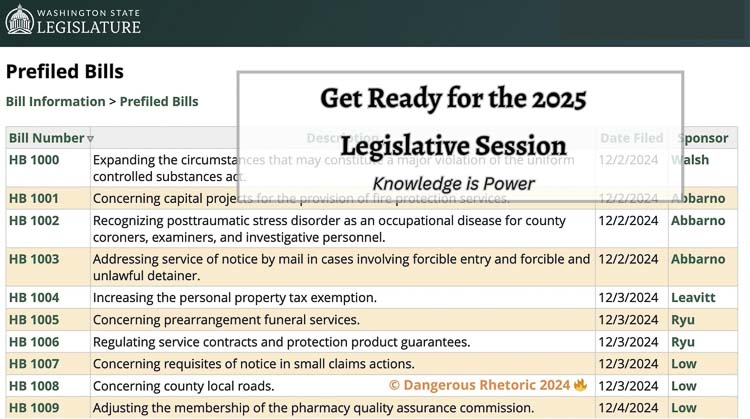
Nancy Churchill believes knowledge is power
Nancy Churchill
Dangerous Rhetoric
The 2025 Washington legislative session starts on Jan. 13, and citizen participation is key to a healthy republic. When we engage, we ensure our voices are heard and help lawmakers address the real concerns of their constituents. Speaking up improves policy outcomes, highlights overlooked issues, and keeps legislators accountable. Participation strengthens the connection between us and our government. Your voice matters.

In Washington state, it’s easy to track bills from start to finish and influence the process early on. Bad bills can often be stopped before a committee hearing if enough people raise concerns. Public hearings—both in person and online—offer another chance to weigh in. I’m so obsessed with helping people become engaged, I’ve created some free online tools to help people better understand how and when they can impact new laws as they are being developed. You can check these tools out by visiting InfluencingOlympia.com and clicking the “Start Today” button. With today’s tools, anyone with a computer and internet can help shape the laws that impact us. It’s time to get involved!
Washington legislators can begin introducing bills in December. As of Dec. 15, 70 house bills and two House proposals for constitutional amendments have been filed. Senators have filed 55 bills so far. Let’s take a look at five bills that conservatives may want to prepare to oppose.
HB 1015: Concerning energy labeling of residential buildings
Energy labeling requirements are burdensome regulations on homeowners and property developers, increasing costs and government bureaucracy. These proposed regulations will interfere with the housing market by increasing compliance costs and driving home prices higher. This bill will make the affordable housing crisis worse, not better.
HB 1031: Mitigating the impact of rising school facility temperatures resulting from climate change.
I’m always skeptical of climate-focused legislation, particularly when it leads to increased public expenditures or imposes mandates on schools. This bill would create a committee which would develop recommendations for indoor school temperature standards, including a maximum temperature, for public school facilities. The committee will waste a lot of taxpayer money discussing how hot a classroom should be before schools are closed, and propose legislation to mandate temperature standards. Why not just let the local school administrators figure that out as has been done for hundreds of years of American Public Education? HB 1031 is a silly, wasteful bill.
HB 1032: Concerning school district elections.
Whenever a Democrat-sponsored bill has such an innocuous name, be prepared for a nasty surprise in the text. In this case, it will be easier for school districts to raise your property taxes. HB 1032 seeks to modify the voter approval requirements for school district bond measures. Currently, such measures require a three-fifths (60%) supermajority vote for approval. This bill would lower this threshold to a simple majority (over 50%) for the validation and ratification of school district indebtedness.
While bond measures fund critical infrastructure improvements, they increase the financial burden on property owners. Property owners would see an increase in their annual property tax bills for the duration of the bond repayment period. House Bill 1032, by lowering the voter approval threshold from a supermajority (60%) to a simple majority (over 50%), could make it easier for districts to pass these measures, potentially resulting in more frequent property tax increases.
HB 1052: Clarifying a hate crime offense
HB 1052 proposes amendments to RCW 9A.36.080 to clarify the definition of a hate crime offense. More clarity is good, as the existing statute is extremely vague. However, I’m concerned about the potential for expanded definitions that could infringe on free speech, overreach into legal interpretations, or disproportionately penalize individuals for perceived intent rather than actions.
For example, one section of the bill specifies that a person is guilty of a hate crime offense who they maliciously and intentionally threaten a specific person or group, placing them in “reasonable fear” of harm to person or property. The bill defines “reasonable fear” as that which a reasonable person sharing the victim’s characteristics would have under the circumstances. I think a much higher standard needs to be defined to prevent misuse of the “reasonable fear/reasonable person” definition.
HB 1056: Concerning law enforcement and local corrections agency misconduct through investigations and legal actions
This anti-police, anti-local control bill proposes granting the state’s attorney general the power to investigate local law enforcement and corrections agencies for violations of the Washington State Constitution or state laws. The AG would also be able to initiate legal actions to enforce compliance and implement necessary reforms when such violations are identified. HB 1056 would potentially remove control over a jurisdiction’s law enforcement from locally elected Prosecutors and officials and their constituents to the state AG’s office.
A new session is a new opportunity
Concerns about government overreach, regulatory burdens, cultural shifts, and the undermining of law enforcement highlight significant challenges in proposed legislation. Bills like HB 1015 and HB 1056 evoke fears of excessive state involvement, infringing on personal or local autonomy. HB 1031, HB 1032 and HB 1015 introduce costly mandates that could burden individuals or businesses or make it easier to increase taxes. Cultural issues, such as those addressed in HB 1052, risk escalating divisions and raising free speech concerns. Additionally, HB 1056’s focus on law enforcement oversight will undermine public safety efforts, which is alarming given our state’s crime rate.
These issues underscore tensions between Democrat desires to centralize and expand government power and Republicans’ goals of preserving personal freedoms, fiscal responsibility, and societal stability. A new session is a new opportunity for everyday citizens like us to participate in the process of lawmaking. Let your voice be heard. Review the prefiled bills and prepare to make your case for or against these proposed bills. Your opportunity to testify will start in January.
Nancy Churchill is a writer and educator in rural eastern Washington State, and the state committeewoman for the Ferry County Republican Party. She may be reached at DangerousRhetoric@pm.me. The opinions expressed in Dangerous Rhetoric are her own. Dangerous Rhetoric is available on thinkspot, Rumble and Substack.
Also read:
- WATCH: Sen. Braun urges Ferguson to get past fearmongering on ‘big beautiful bill’Sen. John Braun criticized Gov. Ferguson’s opposition to the Big Beautiful Bill, calling it partisan fearmongering and defending the bill’s work requirements and spending controls.
- Primary and Special Election important informationClark County Elections will mail ballots beginning July 15 for the Aug. 5 Primary and Special Election. Voters needing a replacement ballot or help registering can contact the Elections Office.
- Public comment prevails: No action taken on Clerk agenda item at Clark County Council meetingClark County Council declined to advance a proposal to make the County Clerk position appointed, deferring the issue to the Charter Review Commission after public concerns over transparency.
- Opinion: ‘Today’s Democratic Party is not our father’s Democratic Party’Editor Ken Vance reflects on how today’s Democratic Party diverges from the values he associates with his father’s generation, citing issues like taxation, gender policies, and shifting ideology in Washington state politics.
- Trump signs ‘big, beautiful bill’ during White House July 4 celebrationPresident Trump signed the “big, beautiful bill” on July 4 during a White House event featuring a military flyover and Republican leaders.











Great job, Nancy Churchill!
Citizen input is welcome on all bills coming before the state legislature!
Leave it to the democrats to find as many ways they can to make our lives more costly and miserable.